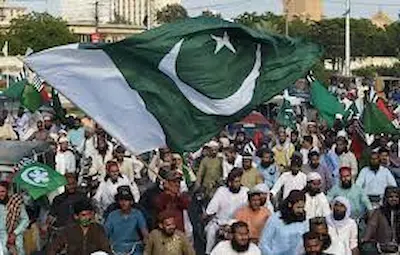The Political Landscape
At Pakistan’s Political Crossroads, the aftermath of an unexpected electoral upset has left the nation in a state of political uncertainty. The recent parliamentary election has thrown the country into a political limbo that few anticipated, with both Nawaz Sharif and incarcerated Imran Khan claiming victory. As the dust settles, the real challenge emerges – charting the course for a nation yearning for stability and direction.

Pakistan’s Political Crossroads : The Imran Khan Factor
Independent candidates aligned with Imran Khan’s Pakistan Tehreek-e-Insaf (PTI) party have orchestrated a significant upset, challenging the status quo that has been dominated by army generals for decades. The unexpected surge in support for these candidates underscores a deeper discontent and a widespread desire for change in a nation grappling with years of political turbulence.
The Shifting Dynamics: Army Generals Lose Grip
The once unassailable control of the army generals, who have long dictated the political narrative in Pakistan, now appears to be waning. The presumed candidate of the military establishment, Nawaz Sharif, claimed victory promptly after the election results were unveiled. However, the landscape has shifted – the independents backing Imran Khan are not a formal party, and their lack of a designated leader complicates the path to governance.
Sharif’s Claim to Victory: A Technicality Amidst Uncertainty
Nawaz Sharif’s claim to being the leader of the largest party is technically accurate, but it comes with its own set of challenges. Independent candidates, not bound by a traditional party structure, hold the key to the formation of the government. Sharif acknowledges the need for alliances and partnerships to secure a seat at the decision-making table, a prospect far from guaranteed in the current scenario where no single entity commands a majority.
The Road Ahead: Days of Horse Trading and Political Alliances
As Pakistan braces for a hung parliament, characterized by a lack of clear majority, the days – perhaps even weeks – ahead promise intense horse trading and negotiations. Nawaz Sharif and his team will engage in efforts to court independent candidates and potentially sway Pakistan People’s Party (PPP) members to form a coalition government. In this landscape of political intricacies, the interdependence of various players becomes evident – each needing the support of the other to navigate the challenging terrain of governance.
The Challenge of a Hung Parliament: Stability at Stake
The prospect of a hung parliament raises concerns about stability in a nation that has grappled with political paralysis in the past. The absence of a decisive majority can potentially impede the swift decision-making needed to address the country’s pressing issues. As Pakistan stands at this critical crossroads, the political leaders face the daunting task of bridging differences and forging alliances to provide the stable governance the country urgently requires.
Conclusion
Pakistan’s political future hangs in the balance, caught between the claims of victory from Nawaz Sharif and Imran Khan’s PTI. The unfolding drama sets the stage for an intricate dance of political maneuvering, with the formation of a coalition government as the ultimate goal. In the coming days, the nation will witness the culmination of negotiations, alliances, and compromises as Pakistan endeavors to establish a government that can navigate the complexities of its political landscape.
FAQ’s: Pakistan’s Political Crossroads
Q: What led to the unexpected electoral upset in Pakistan?
A: The surprising electoral upset can be attributed to the significant support garnered by independent candidates affiliated with Imran Khan’s PTI party. This surge reflects the growing discontent and a desire for change in a nation with a history of political turbulence.
Q: How has the control of army generals shifted in the wake of the election?
A: The once dominant influence of army generals in Pakistani politics seems to be diminishing. The unexpected success of independent candidates challenges the traditional narrative, indicating a shifting dynamic in the power structure.
Q: What challenges does Nawaz Sharif face despite claiming victory?
A: Despite technically leading the largest party, Nawaz Sharif confronts challenges in forming a government. Independent candidates, not aligned with a formal party structure, play a pivotal role, necessitating alliances and partnerships for effective governance.
Q: What does a hung parliament mean for the stability of Pakistan?
A: A hung parliament raises concerns about political stability, given the absence of a clear majority. Decision-making may become protracted, potentially impeding swift actions needed to address pressing issues in the nation.

